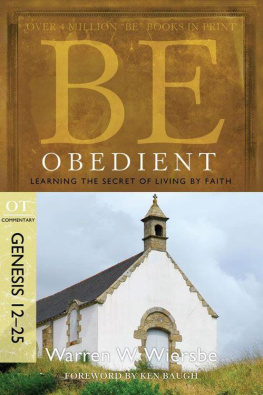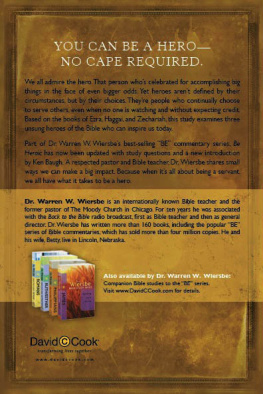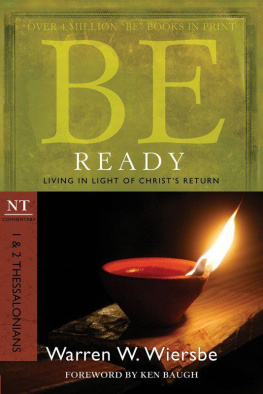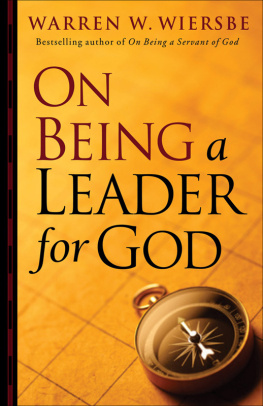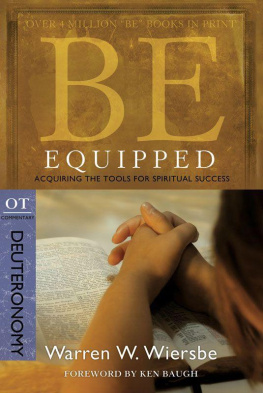Contents

Pentecost (Acts 12)
The Name of Jesus (Acts 34)
The Clever Foe (Acts 57)
Becoming Salt (Acts 812)
Paul Begins His Ministry (Acts 1316)
Another Journey (Acts 1718)
Ephesus and After (Acts 1922)
The Prisoner (Acts 2328)
Summary and Review
Introduction to Acts
Be Dynamic
We call Dr. Lukes second volume The Acts of the Apostles, when really it is the Acts of Gods People Empowered by the Holy Spirit. It is a story of power. Gods people today share the same spiritual dynamic that energized the early saints. If we are yielded to the Spirit, we can be adding new chapters to the exciting story of the church.
There are some nonrepeatable events in Acts, as well as some transitional happenings; but the basic spiritual principles are the same today as when Peter and Paul ministered.
Be Daring
The eminent American psychologist William James said, It is only by risking our persons from one hour to another that we live at all. And the popular motivational expert Earl Nightingale claimed, Wherever there is danger, there lurks opportunity; wherever there is opportunity, there lurks danger.
Paul and his friends would say a hearty Amen! to these two statements and would back up their votes with the testimony of their lives. After all, in the early church, Paul and Barnabas were known as men who have risked their lives for the name of our Lord Jesus Christ (Acts 15:26).
If we have the dynamic of the Holy Spirit in our lives, then surely we will not be satisfied with Christian living as usual. We will want the Lord to put us where the real action is and make us daring pioneers instead of comfortable spectators.
We need to look to the essentials and discover afresh the spiritual dynamics of the Word of God and prayer, love and fellowship, persecution, and personal witness for Christ.
Warren W. Wiersbe
How to Use This Study
This study is designed for both individual and small-group use. Weve divided it into eight lessonseach references one or more chapters in Warren W. Wiersbes commentaries Be Dynamic and Be Daring (second editions, David C. Cook, 2009). While reading Be Dynamic and Be Daring is not a prerequisite for going through this study, the additional insights and background Wiersbe offers can greatly enhance your study experience.
The Getting Started questions at the beginning of each lesson offer you an opportunity to record your first thoughts and reactions to the study text. This is an important step in the study process as those first impressions often include clues about what it is your heart is longing to discover.
The bulk of the study is found in the Going Deeper questions. These dive into the Bible text and, along with helpful excerpts from Wiersbes commentary, help you examine not only the original context and meaning of the verses but also modern application.
Looking Inward narrows the focus down to your personal story. These intimate questions can be a bit uncomfortable at times, but dont shy away from honesty here. This is where you are asked to stand before the mirror of Gods Word and look closely at what you see. Its the place to take a good look at yourself in light of the lesson and search for ways in which you can grow in faith.
Going Forward is the place where you can commit to paper those things you want or need to do in order to better live out the discoveries you made in the Looking Inward section. Dont skip or skim through this. Take the time to really consider what practical steps you might take to move closer to Christ. Then share your thoughts with a trusted friend who can act as an encourager and accountability partner.
Finally, there is a brief Seeking Help section to close the lesson. This is a reminder for you to invite God into your spiritual-growth process. If you choose to write out a prayer in this section, come back to it as you work through the lesson and continue to seek the Holy Spirits guidance as you discover Gods will for your life.
Tips for Small Groups
A small group is a dynamic thing. One week it might seem like a group of close-knit friends. The next it might seem more like a group of uncomfortable strangers. A small-group leaders role is to read these subtle changes and adjust the tone of the discussion accordingly.
Small groups need to be safe places for people to talk openly. It is through shared wrestling with difficult life issues that some of the greatest personal growth is discovered. But in order for the group to feel safe, participants need to know its okay not to share sometimes. Always invite honest disclosure, but never force someone to speak if he or she isnt comfortable doing so. (A savvy leader will follow up later with a group member who isnt comfortable sharing in a group setting to see if a one-on-one discussion is more appropriate.)
Have volunteers take turns reading excerpts from Scripture or from the commentary. The more each person is involved even in the mundane tasks, the more theyll feel comfortable opening up in more meaningful ways.
The leader should watch the clock and keep the discussion moving. Sometimes there may be more Going Deeper questions than your group can cover in your available time. If youve had a fruitful discussion, its okay to move on without finishing everything. And if you think the group is getting bogged down on a question or has taken off on a tangent, you can simply say, Lets go on to question 5. Be sure to save at least ten to fifteen minutes for the Going Forward questions.
Finally, soak your group meetings in prayerbefore you begin, during as needed, and always at the end of your time together.
Lesson 1
Pentecost
(ACTS 12)
Before you begin
Pray for the Holy Spirit to reveal truth and wisdom as you go through this lesson.
Read Acts 12. This lesson references chapters 12 in Be Dynamic. It will be helpful for you to have your Bible and a copy of the commentary available as you work through this lesson.
Getting Started
From the Commentary
After His resurrection, Jesus remained on earth for forty days and ministered to His disciples. He had already opened their minds to understand the Old Testament message about Himself (Luke 24:4448), but there were other lessons they needed to learn before they could launch out in their new ministry. Jesus appeared and disappeared during those forty days, and the believers never knew when He might show up. It was excellent preparation for the church because the days were soon coming when He would no longer be on earth to instruct them personally. We believers today never know when our Lord may return, so our situation is somewhat similar to theirs.
Be Dynamic, page 20
1. Read Acts 1:111. How is Jesus postresurrection teaching represented in the book of Acts? Why do you think it was so important for the church that Jesus continued to minister after His resurrection? How is our situation similar to that of the early church?
More to Consider: Read Romans 10:910 and 1 Corinthians 15:18, 1619. What do these verses tell us about the importance of Jesus resurrection? How might the early church have suffered if people didnt believe this truth?
2. Choose one verse or phrase from Acts 12 that stands out to you. This could be something youre intrigued by, something that makes you uncomfortable, something that puzzles you, something that resonates with you, or just something you want to examine further. Write that here.
Going Deeper
From the Commentary
Acts 1:8 is a key verse. To begin with, it explains that the power of the church comes from the Holy Spirit and not from man (see Zech. 4:6). Gods people experienced repeated fillings of the Spirit as they faced new opportunities and obstacles (Acts 2:4; 4:8, 31; 9:17; 13:9). Ordinary people were able to do extraordinary things because the Spirit of God was at work in their lives. The ministry of the Holy Spirit is not a luxury; it is an absolute necessity.


